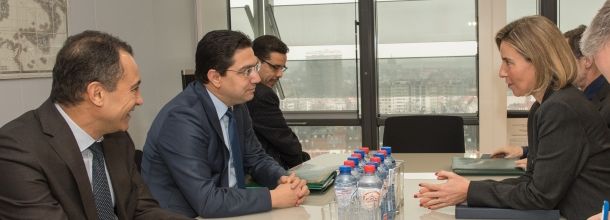
Both the EU and Morocco seem keen conclude the negotiations to keep occupied Western Sahara within the territorial scope of their bilateral trade deal - in spite of a judgment by the EU's highest Court ruling this out.
23 October 2017, the European Union's Foreign Affairs Chief, Federica Mogherini, met with Moroccan Foreign Affairs Minister Nasser Bourita in Brussels. According to the official press release by the EU's External Action Service, the meeting allowed both parties to "note the progress made in the ongoing negotiations for amending the Protocols to the Agricultural Agreement between the EU and the Kingdom of Morocco. The High Representative [Mogherini] and the Minister [Bourita] expressed their common determination to complete them as soon as possible."
At the root of these negotiations lies a judgment of the Court of Justice of the EU (CJEU) of December 2016, concluding that Western Sahara is a territory that is "distinct and separate" from Morocco, and that as such, no EU trade or association deal with Morocco can be applied to the territory unless with the explicit consent of the people of the territory: the Saharawis. One of the direct implications for this ruling is the end of preferential access to the EU market for goods coming from occupied Western Sahara (although the exact implementation of this legally binding obligation remains unclear).
However, from what Western Sahara Resource Watch can establish, no effort has been made by Morocco or the EU to seek the consent of the people of the territory in the the trade talks, a requirement that CJEU was crystal clear about.
Unwilling to stop the influx of goods from Western Sahara, and confronted with an angry Rabat that threatened to end all cooperation on stopping sub-Sahara Africa migration into the Union, the EU turned to Morocco to negotiate a way around the Court Judgment.
While it is unclear how the EU Commission, tasked with the talks, will assure itself of the consent of the people of Western Sahara, the Moroccan government does seem to have spotted a way of turning this obstacle into "an opportunity" - as Moroccan media today puts it: "granting Morocco the opportunity to place the local elected representatives, deputies and councilors of the province as representatives of the inhabitants".
Western Sahara Resource Watch warns that this is a highly problematic, and illegal, approach.
"The Court has clearly dictated that for any deal to lawfully affect the territory of Western Sahara, it requires the consent of the people of the territory, not the population of the territory - which are two different notions", says Davide Contini from Western Sahara Resource Watch.
He stresses that there is no mention of the population of Western Sahara in the judgment from the court.
"The fact that Morocco seeks to obfuscate those two concepts, is unacceptable, yet completely unsurprising. We expect that the EU supports the basic principles of international law, and chooses to respect the ruling from the CJEU. Negotiating with Morocco or with Moroccan institutions over the territory of Western Sahara is illegal and puts an obstacle to the UN peace process. It also sets a dangerous precedent for the EU to negotiate similar trade deals with Russian institutions in Crimea or Israeli bodies in illegal settlements, with reference to the Russian or Israeli populations", Contini stated.
US eyes minerals in occupied Western Sahara
Seeking to position itself as a key supplier of strategic minerals for Western powers, Morocco has signed a new agreement with the United States that covers Western Sahara’s waters and the critical minerals harboured there.
TAQA-Moeve obtains land in occupied Western Sahara
Morocco’s push for green hydrogen has taken a decisive step forward - on territory it does not legally own.
EU-Morocco Statement: autonomy without self-determination, law without lawfulness
A joint statement that came out of last week’s EU-Morocco Association Council asks readers to believe in a fiction: that an undefined autonomy plan imposed by an occupying power can satisfy the right to self-determination, and that respect for international law can coexist with the systematic ignoring of the EU’s own highest court.
Greenland Yes, Western Sahara No? The EU’s self-determination test
As the European Union rightly rallies behind Greenlanders’ right to decide their own future in the face of external pressure, a test of the EU’s real commitment to self-determination is quietly unfolding in Brussels.



